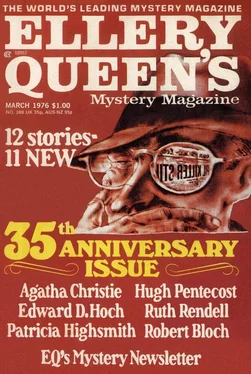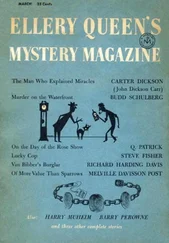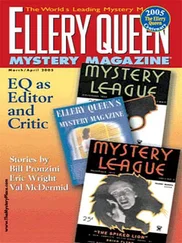Аврам Дэвидсон - Ellery Queen’s Mystery Magazine. Vol. 67, No. 3. Whole No. 388, March 1976
Здесь есть возможность читать онлайн «Аврам Дэвидсон - Ellery Queen’s Mystery Magazine. Vol. 67, No. 3. Whole No. 388, March 1976» весь текст электронной книги совершенно бесплатно (целиком полную версию без сокращений). В некоторых случаях можно слушать аудио, скачать через торрент в формате fb2 и присутствует краткое содержание. Город: New York, Год выпуска: 1976, Издательство: Davis Publications, Жанр: Детектив, на английском языке. Описание произведения, (предисловие) а так же отзывы посетителей доступны на портале библиотеки ЛибКат.
- Название:Ellery Queen’s Mystery Magazine. Vol. 67, No. 3. Whole No. 388, March 1976
- Автор:
- Издательство:Davis Publications
- Жанр:
- Год:1976
- Город:New York
- ISBN:нет данных
- Рейтинг книги:5 / 5. Голосов: 1
-
Избранное:Добавить в избранное
- Отзывы:
-
Ваша оценка:
- 100
- 1
- 2
- 3
- 4
- 5
Ellery Queen’s Mystery Magazine. Vol. 67, No. 3. Whole No. 388, March 1976: краткое содержание, описание и аннотация
Предлагаем к чтению аннотацию, описание, краткое содержание или предисловие (зависит от того, что написал сам автор книги «Ellery Queen’s Mystery Magazine. Vol. 67, No. 3. Whole No. 388, March 1976»). Если вы не нашли необходимую информацию о книге — напишите в комментариях, мы постараемся отыскать её.
Ellery Queen’s Mystery Magazine. Vol. 67, No. 3. Whole No. 388, March 1976 — читать онлайн бесплатно полную книгу (весь текст) целиком
Ниже представлен текст книги, разбитый по страницам. Система сохранения места последней прочитанной страницы, позволяет с удобством читать онлайн бесплатно книгу «Ellery Queen’s Mystery Magazine. Vol. 67, No. 3. Whole No. 388, March 1976», без необходимости каждый раз заново искать на чём Вы остановились. Поставьте закладку, и сможете в любой момент перейти на страницу, на которой закончили чтение.
Интервал:
Закладка:
“Ah!” A flash of interest lit up Sir Edward’s face. “About a month ago, wasn’t it?”
The girl nodded. “Rather less than that — three weeks.”
“Yes, I remember. She was hit on the head in her own house. They didn’t get the fellow who did it.”
Again Magdalen Vaughan nodded. “They didn’t get the man — I don’t believe they ever will get the man. You see, there mightn’t be any man to get.”
“What?”
“Yes, it’s awful. Nothing’s come out about it in the papers. But that’s what the police think. They nobody came to the house that night.”
“You mean—?”
“That it’s one of us four. It must be. They don’t know which — and we don’t know which... We don’t know. And we sit there every day looking at each other surreptitiously and wondering. Oh, if only it could have been someone from outside — but I don’t see how it can...”
Sir Edward stared at her, his interest rising.
“You mean members of the family are under suspicion?”
“Yes, that’s what I mean. The police haven’t said so, of course. They’ve been quite polite and nice. But they’ve ransacked the house, they’ve questioned us all, and Martha again and again... And because they don’t know which, they’re holding their hand. I’m so frightened, so horribly frightened.”
“My dear child. Come now, surely you are exaggerating.”
“I’m not. It’s one of us four — it must be.”
“Who are the four to whom you refer?”
Magdalen sat up straight and spoke more composedly.
“There’s myself and Matthew. Aunt Lily was our great-aunt. She was my grandmother’s sister. We’ve lived with her ever since we were fourteen — we’re twins, you know. Then there was William Crabtree. He was her nephew, her brother’s child. He lived there, too, with his wife, Emily.”
“She supported them?”
“More or less. He has a little money of his own, but he’s not strong and has to live at home. He’s a quiet, dreamy sort of man. I’m sure it would have been impossible for him to have — oh, it’s awful of me to think of it even!”
“I am still very far from understanding the position. Perhaps you would not mind running over the facts — if it does not distress you too much.”
“Oh, no, I want to tell you. And it’s all quite clear in my mind still — horribly clear. We’d had tea, you understand, and we’d all gone off to do things of our own. I to do some dressmaking, Matthew to type an article — he does a little journalism; William to do his stamps. Emily hadn’t been down to tea. She’d taken a headache powder and was lying down. So there we were, all of us, busy and occupied. And when Martha went in to set the table for supper at half-past seven, there Aunt Lily was — dead. Her head — oh, it’s horrible — all crushed in.”
“The weapon was found, I think?”
“Yes. It was a heavy paperweight that always lay on the table by the door. The police tested it for fingerprints, but there were none. It had been wiped clean.”
“And your first surmise?”
“We thought, of course, it was a burglar. There were two or three drawers of the bureau pulled out, as though a thief had been looking for something. Of course we thought it was a burglar! And then the police came and they said she had been dead at least an hour, and asked Martha who had been to the house, and Martha said nobody. And all the windows were fastened on the inside, and there seemed no signs of anything having been tampered with. And then they began to ask us questions.”
She stopped. Her eyes, frightened and imploring, sought Sir Edward’s in search of reassurance.
“For instance, who benefited by your aunt’s death?”
“That’s simple. We all benefit equally. She left her money to be divided in equal shares among the four of us.”
“And what was the value of her estate?”
“The lawyer told us it will come to about eighty thousand pounds after the death duties are paid.”
Sir Edward opened his eyes in some slight surprise.
“That is quite a considerable sum. You knew, I suppose, the total of your aunt’s fortune?”
Magdalen shook her head.
“No, it came quite as a surprise to us. Aunt Lily was always terribly careful about money. She kept just the one servant and always talked a lot about economy.”
Sir Edward nodded thoughtfully. Magdalen leaned forward a little in her chair.
“You will help me — you will?”
Her words came to Sir Edward as a shock just at the moment when he was becoming interested in her story for its own sake.
“My dear young lady, what can I possibly do? If you want good legal advice I can give you the name—”
She interrupted him. “Oh, I don’t want that sort of thing. I want you to help me personally, as a friend.”
“That’s very charming of you, but—”
“I want you to come to our house. I want you to ask questions. I want you to see and judge for yourself.”
“But my dear young—”
“Remember, you promised. Anywhere, any time, you said, if I wanted help—”
Her eyes, pleading yet confident, looked into his. He felt ashamed and strangely touched. That terrific sincerity of hers, that absolute belief in an idle promise, ten years old, as a sacred binding thing. How many men had not said those self-same words — a cliché almost! — and how few of them had ever been called on to make good.
He said rather weakly, “I’m sure there are many people who could advise you better than I could.”
“I’ve got lots of friends — naturally.” He was amused by her naive self-assurance. “But, you see, none of them is clever. Not like you. You’re used to questioning people. And with all your experience you must know.”
“Know what?”
“Whether they’re innocent or guilty.”
He smiled rather grimly to himself. He flattered himself that, on the whole, he usually had, known! Though, on many occasions, his private opinion had not been that of the jury.
Magdalen pushed back her hat from her forehead with a nervous gesture, looked round the room, and said, “How quiet it is here. Don’t you sometimes long for some noise?”
The cul-de-sac! All unwittingly her words, spoken at random, touched him on the raw. A cul-de-sac. Yes, but there was always a way out — the way you had come — the way back into the world.
Something impetuous and youthful stirred in him. Her simple trust appealed to the best side of his nature — and her problem appealed to something else, the innate criminologist in him. He wanted to see these people of whom she spoke. He wanted to form his own judgment.
He said, “If you are really convinced I can be of any use... Mind, I guarantee nothing.”
He expected her to be overwhelmed with delight, but she took it very calmly.
“I knew you would do it. I’ve always thought of you as a real friend. Will you come back with me now?”
“No. I think if I pay you a visit tomorrow it will be more satisfactory. Will you give me the name and address of Miss Crabtree’s lawyer? I may want to ask him a few questions.”
She wrote it down and handed it to him. Then she got up and said rather shyly, “I–I’m really most awfully grateful. Goodbye.”
“And your own address?”
“How stupid of me. 18 Palatine Walk, Chelsea.”
It was three o’clock on the following afternoon when Sir Edward Palliser approached 18 Palatine Walk with a sober, measured tread. In the interval he had found out several things. He had paid a visit that morning to Scotland Yard, where the Assistant Commissioner was an old friend of his, and he had also had an interview with the late Miss Crabtree’s lawyer. As a result he had a clearer vision of the circumstances.
Читать дальшеИнтервал:
Закладка:
Похожие книги на «Ellery Queen’s Mystery Magazine. Vol. 67, No. 3. Whole No. 388, March 1976»
Представляем Вашему вниманию похожие книги на «Ellery Queen’s Mystery Magazine. Vol. 67, No. 3. Whole No. 388, March 1976» списком для выбора. Мы отобрали схожую по названию и смыслу литературу в надежде предоставить читателям больше вариантов отыскать новые, интересные, ещё непрочитанные произведения.
Обсуждение, отзывы о книге «Ellery Queen’s Mystery Magazine. Vol. 67, No. 3. Whole No. 388, March 1976» и просто собственные мнения читателей. Оставьте ваши комментарии, напишите, что Вы думаете о произведении, его смысле или главных героях. Укажите что конкретно понравилось, а что нет, и почему Вы так считаете.












